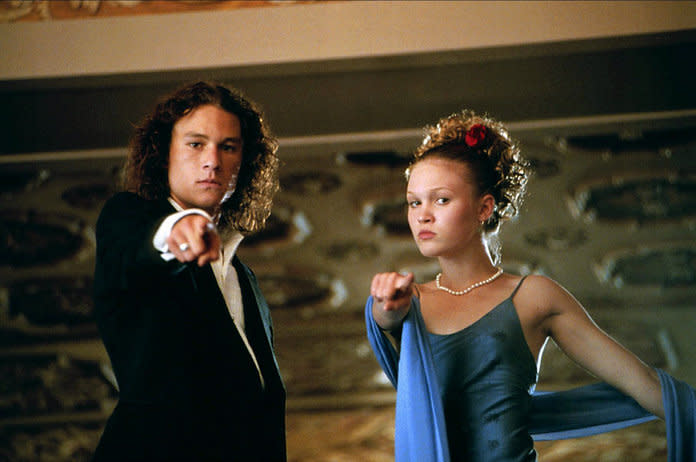The One Reason 10 Things I Hate About You Still Holds Up
10 Things I Hate About You sometimes feels like a period film about the ‘90s — wisps of gelled hair framing everyone’s faces, comically oversized suit jackets, and three (three!) Letters to Cleo cameos. But it also totally holds up 20 years later: I still want to be Julia Stiles’ brooding, sarcastic Kat Stratford, and I’m still in love with Heath Ledger as the tenderhearted bad boy Patrick Verona.
Part of the reason it still feels so relevant is that it defies rom-com conventions by giving a misfit female lead a happy ending, without requiring her to shove herself into a conventional mold. In 2019, when so much of the cultural conversation is about accepting people the way they are — from body positivity to destigmatizing mental illness to multitudes of gender expressions — the message feels very current.
Most rom-coms before this one rely on the idea that the girl has to change everything about herself in order to deserve love, from Sandy’s bad girl reinvention in Grease to problematic fav Pretty Woman’s “savior ‘fixes’ the sex worker” storyline. ‘90s movies especially loved a redemptive makeover: In Clueless, when Tai is feeling down about a boy not liking her, Cher cheers her up with a makeover, which catapults her into popularity. Drew Barrymore’s character in Never Been Kissed goes undercover as a high school student — but with all the poise and polish of a grown woman — and gets the guy she never could as an awkward braces-wearing teen. (By the way, the guy is also her teacher, and we’re supposed to be cool with that). The whole plot of She’s All That, an extreme example of this trope that came out in January of 1999, just two months before 10 Things I Hate About You, is about a popular boy transforming a nerdy girl into prom queen material, and falling for her in the process.

Allstar Picture Library/Alamy Stock Photo
It’s worth noting that all of these actresses are thin, white women, so the limits these stories set on who is viewed as “plain” or who’s even allowed the “redemption” of changing themselves for love is a whole other problem. I love all of these movies, don’t get me wrong, but the message — get the guy by turning into the kind of girl he likes — not only leaves a lot to be desired, it makes them feel outdated in a way that 10 Things I Hate About You doesn’t.
Like She’s All That, 10 Things starts with the female lead portrayed as an undesirable misfit. But this time, it’s the guy’s perspective that has to change — not the girl’s looks. Patrick is initially paid to ask out surly, unpopular Kat as part of a tangled plot involving her sister, but he ends up falling for her — and not a hair-down-glasses-off-squeezed-into-a-mini-dress version of her, but the same tough, snarky, intellectual Kat she was all along.
Kat doesn’t change for Patrick, but he stops smoking because she doesn’t like it. Early in the movie he calls the music she likes “chicks who can’t play their instruments,” but at the end, he buys her a guitar. This is significant both because it shows his growth and support of her creative pursuits, and because he uses the money he was originally paid to date Kat to facilitate an act of atonement for his deception. Also important to the charm of 10 Things is that Patrick is an outsider, too. He’s not the prince charming who sweeps in and redeems the untouchable girl — he’s a new kid at their school, whose classmates either fear him, spread outlandish rumors about him, or both.
This is an unabashedly feminist movie, which is not something you can say about a ton of romantic comedies (or much of anything) from its era. It’s also especially impressive because it’s an adaptation of The Taming of the Shrew, one of the only Shakespeare plays to age incredibly poorly because of its woman-hating plot (though some scholars speculate that it was satire, and if that’s true maybe it was the original feminist rom-com).
RELATED: The ‘90s Weren’t That Great for Women — Just Ask Lorena Bobbitt
This movie meant so much to so many people when it came out 20 years ago because at its heart — outlandish rules, schemes, and stunts aside — it’s a story about two misfits finding love, without having to sacrifice or change who they are. And what’s more timeless than that?
